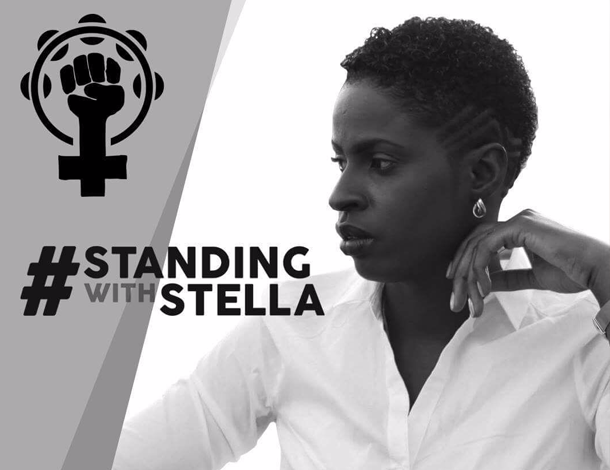As concerned members of the Caribbean region and diaspora, we are outraged by the unreasonable and absurd charges of three counts of “malicious communication” under Section 9 (1) of the Cybercrimes Act of 2015 by the Jamaican state towards human rights defender and activist, Latoya Nugent. We are also outraged by the unfair treatment and hostility demonstrated during her arrest in which she was denied medical attention when needed.

Further, we believe, as other activists across the region, that Latoya is being charged in direct response to her activism against sexual violence. Specifically, she is being targeted for calling out perpetrators of violence. We are relieved at the most recent news (22nd March) that Latoya’s bail has been extended, yet she still faces charges in court as the Jamaican state attempts to silence her work and the work of other human rights activists. We believe that Latoya is innocent of the charges, and we support her intention to fight them.
We stand with Latoya Nugent and the Tambourine Army.
We hope that she will be vindicated by the court.
The work of the Tambourine Army is critical to uprooting the scourge of sexual violence and securing the rights and freedom of women and children in Jamaica. This work reflects the recent movement building across the region to end gender based violence. The focus in Jamaica led by the Tambourine Army is on survivor empowerment and breaking silence around sexual abuse and violence against women and girls. This is necessary work in creating change in our communities across the region. The Jamaican state ought to be supporting these efforts instead of targeting activists who dare to speak out against violence.
What happened to Latoya is not specific to Jamaica.
Across the Caribbean region, we see an increasing attempt to enact cyber crime and repressive legislation that fails to protect the most vulnerable and the most marginalized in our communities; and instead attempts to silence and criminalize dissent and human rights organizing. When inappropriate images and videos of young girls, boys and children are widely distributed across the internet, the state’s commitment to its own legislation and to human rights remains silent.
We recognize that the internet is often used as a space for human rights defenders to disseminate information, organize, advocate and mobilize.
Accordingly, what we need are digital security frameworks that not only centre, but that protect, human rights.
The Association of Women’s Rights in Development (AWID) in its “Our Right to Safety Report”, noted the numbers of “[...] cases in which human rights defenders have been charged with defamation and, in some cases, blasphemy because they have published articles, blog entries or tweets or expressed opinions in public.”
Death threats, online stalking, image manipulation and harassment continue to be directed towards human rights defenders through the use of text messages, emails and other digital media platforms. This underscores the need to decriminalize online dissent; we don’t need to be criminalized, we must be protected!
We are all impacted by Latoya’s arrest.
As democratic spaces across the Caribbean region continue to shrink, in addition to being accompanied by increasing police and state surveillance and repression, we recognize the urgency and necessity of maintaining spaces for civil disobedience and organizing. We demand that our fundamental human right to resist and mobilize be respected. And we call upon the government of Jamaica, specifically the Director of Public Prosecutions Paula Llewellyn who has taken an interest in this case, to drop all charges against Latoya Nugent.
When the state becomes preoccupied with arresting human rights defenders instead of advocating for the welfare of its people, we the people, are no longer a priority. It is time that we all become a priority. We will not waiver in our support for Latoya. We will remain steadfast in our commitment to human rights and justice. Even when our voices break, we will not be silenced.
As Assata Shakur reminds us:
“It is our duty to fight for our freedom.
It is our duty to win.
We must love each other and support each other.
We have nothing to lose but our chains.”
In solidarity and support,
-
Kimalee Phillip, Association for Women’s Rights in Development (AWID)
-
Samantha Peters, advocate and educator
-
Malaika Brooks-Smith-Lowe, co-founder Groundation Grenada
-
Damarlie Antoine, educator and feminist
-
Ayisha John, Groundation Grenada
-
KizzyAnn Abraham, advocate for Key Populations
-
Maureen St.Clair, peace educator/activist/artist
-
Angelique V. Nixon, CAISO sex & gender justice; IGDS UWI Trinidad
-
Stephanie Leitch, Founder WOMANTRA
-
Beverly Bain, Lecturer, Feminist activist and educator,University of Toronto
-
Nicole Hendrickson, co-founder & lead organiser Firecircle
-
Attillah Springer, writer and activist; Say Something TT
-
Tonya Haynes, Code Red & Catchafyah Feminist Network; IGDS UWI Barbados
-
Peter Weller, Caribbean Male Action Network (CariMAN)
-
Caroline Allen, Researcher on Sexual and Reproductive Health and Rights
-
Amina Doherty, Association for Women’s Rights in Development (AWID)
-
Alicia Wallace, Director, Equality Bahamas
-
Gabrielle Hosein, CAFRA; IGDS UWI Trinidad
-
Hazel Brown, Network of NGOs of Trinidad and Tobago for the Advancement of Women
-
Reunka Anandjit, IGDS UWI Trinidad
-
Sunity Maharaj, Side by Side, Trinidad and Tobago
-
Elysse Marcellin, independent activist
-
Tyrone Buckmire, Caribbean Male Action Network (CariMAN) Grenada
-
Abbas Mancey, Caribbean Male Action Network (CariMAN) Guyana/ Canada
-
Marlon Bascombe, Caribbean Male Action Network (CariMAN) Trinidad and Tobago
-
Vidyaratha Kissoon, Caribbean Male Action Network (CariMAN) Guyana
